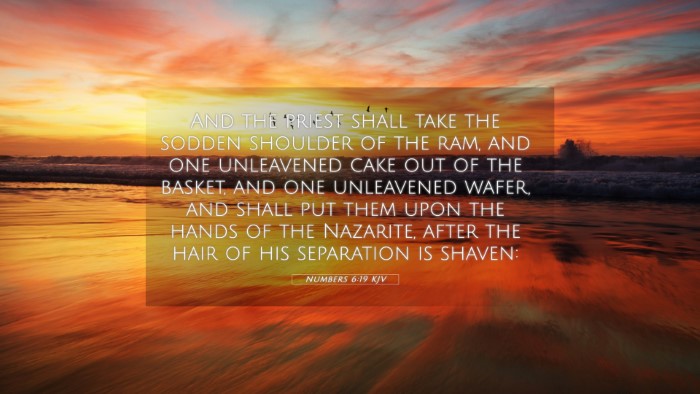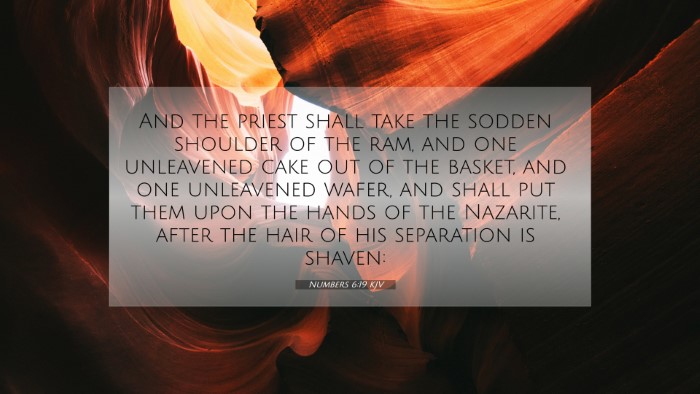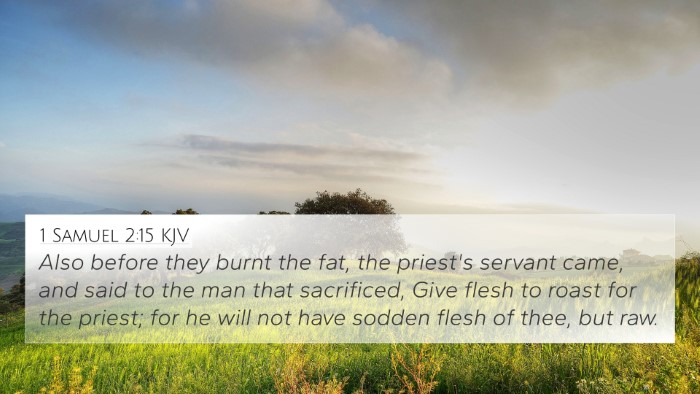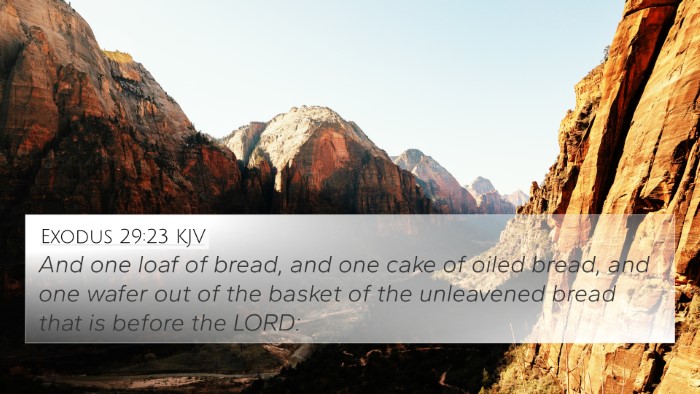Understanding Numbers 6:19
Verse: Numbers 6:19
"And the priest shall take the sodden shoulder of the ram, and one unleavened cake out of the basket, and one unleavened wafer, and shall put them upon the hands of the Nazarite, after the hair of his separation is shaven."
This verse highlights the ritual practices associated with the Nazarite vow, emphasizing the symbolic interconnections between the offerings and the spiritual commitment of the Nazarite.
Commentary Insights
Matthew Henry's Commentary
Matthew Henry elaborates on the significance of the priestly role in administering these offerings. He notes that the act of presenting these items symbolizes the dedication and separation of the Nazarite to God. The offerings serve to illustrate the costly nature of one's commitment and the importance of community support in spiritual endeavors.
Albert Barnes' Commentary
Barnes stresses the importance of the priest’s involvement and the implications of the offerings. He points out that the shoulder of the ram signifies strength and the unleavened cakes and wafers represent purity. The act of offering these is a way for the Nazarite to express gratitude and devotion, reinforcing the theme of separation unto holiness.
Adam Clarke's Commentary
Clarke emphasizes the cultural context, noting that these offerings were not just ritualistic but deeply rooted in the community's religious practices. The Nazarite's vow, while personal, also implicated the community, suggesting that individual piety can have corporate ramifications.
Thematic Connections
Numbers 6:19 offers a profound connection to various biblical themes:
- Separation and Holiness: Indicates a divine calling to live set apart from the world.
- Community and Sacrifice: Highlights the communal aspect of worship and shared faith.
- Purity and Dedication: Reinforces the importance of purity in offerings and the heart's attitude towards God.
Cross-References
This verse connects with several other scriptures, enhancing its meaning through comparative analysis:
- Leviticus 10:14: Discusses the offerings designated for priests and their sacrificial role.
- Numbers 6:2: Introduces the Nazarite vow and its significance.
- 1 Samuel 1:11: Hannah's vow demonstrates a personal commitment to God.
- Romans 12:1: The call for believers to present their bodies as living sacrifices.
- Hebrews 10:14: The significance of Christ's one-time sacrifice for holiness.
- 2 Corinthians 6:17: Calls believers to come out and be separate, linking to the Nazarite's dedication.
- Matthew 5:48: The call to be perfect, further emphasizing spiritual aspirations.
- Galatians 5:22-23: The fruit of the Spirit, demonstrating the result of a dedicated life.
- John 15:16: The call to bear fruit that lasts, akin to the lasting nature of the Nazarite’s commitment.
- Hebrews 7:27: Illustrates the completeness of Jesus' sacrifice compared to the continual priestly offerings.
Tools for Bible Cross-Referencing
Studying Numbers 6:19 can be greatly enhanced by utilizing various tools for Bible cross-referencing:
- Bible Concordance: An essential guide for finding related verses.
- Bible Cross-Reference Guide: Structured aids for thematic studies.
- Cross-Reference Bible Study: Methods to explore connections between texts.
- Bible Reference Resources: Comprehensive materials for deeper understanding.
- Bible Chain References: A linking system to trace themes through scripture.
Understanding Inter-Biblical Dialogue
When interpreting Numbers 6:19, it is vital to appreciate the inter-Biblical dialogue it engenders. The connections made between diverse scriptural passages not only elucidate the verse's meaning but also enrich the reader's understanding of Biblical theology, holiness, and community practice.
Conclusion
In conclusion, Numbers 6:19 serves as a poignant reminder of the significance of dedication and ritual in the life of a believer. Through careful examination of this verse and its rich interconnections, one can appreciate the depth of commitment required in following God’s calling. The integrations of communal and personal faith highlighted in this scripture resonate with ongoing dialogues within the entirety of the Bible.







